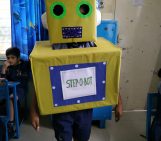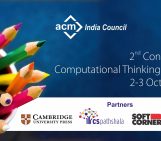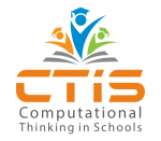The second conference on Computational Thinking in Schools (CTiS2020) was held virtually on 2nd and 3rd October 2020 and saw participation of more than 1000 delegates which included teachers, Principals, educators and organisations working in the field of education from across 15 countries.
CTiS, the first of its kind conference for teachers in computational thinking in India provides a platform for teachers to share innovations, experiences and best practices, was organized by CSpathshala (www.cspathshala.org), an ACM (Association for Computing Machinery) India initiative (india.acm.org). The conference sponsors included TCS, Cambridge University Press and Softcorner. CSpathshala is a not for profit, initiative to bring a modern computing curriculum, emphasising on problem solving and computational thinking skills, to Indian schools.
Arun Kadekodi, Organising Committee Chair, said, “This year CTiS2020, a virtual conference saw an overwhelming response with over 1650 registrations from teachers, principals and organisations working in the field of education from 16 countries.” Arun also thanked the committees and the volunteers for their support.
Vipul Shah, Head, CSpathshala initiative, in his opening remarks said, ”CSpathshala set up in 2016 with a vision that every child in India learns computational thinking by 2030. The advocacy efforts to influence policymakers in including computational thinking are now paying off and the NEP 2020 recognizes and recommends that CT be taught in schools. ” Vipul also thanked the CSpathshala partners
Jayant Haritsa, IISc, President, ACM India, said, “On behalf of ACM India, I am delighted that CTiS2020 is finally happening in virtual and the reach is much higher. This also fits in well with the NEP with inclusion of CT and the formulation of this policy ACM India members have played a key role. Dijkstra said, that Computer Science is no more about computers than astronomy is about telescopes and this spirit is embodied in the conference theme of computational thinking where the emphasis is on Science and rather than the use of computers.”
Prof. Venkatesh Raman, Program Committee Co-Chair, shared that, “The great joy and enthusiasm amongst teachers implementing CSpathshala curriculum is clearly visible through the abstracts. For CTiS2020, we had received 307 abstracts from teachers implementing computational thinking curriculum across 6 states and we had two regional pre-selection meetings. All abstracts showed interesting and innovative example, encouraging feedback on the curriculum and challenges faced in implementation. Of the 307 abstracts, 14 were selected for presentation based on individual experience and novelty of the examples and impact and the chair invited 3 speakers and 2 special presentations”
CTiS2020 featured Keynote Speaker Prof. Sridhar Iyer, IIT Bombay and international speakers, Distinguished Speaker Prof. Jeannette M Wing, Columbia University, NY and Jake Baskin, Executive Director, Computer Science Teachers Association, the world’s leading association for K-12 computer science teachers. Prof. Sridhar Iyer, shared his insights on Computational Thinking Education & Research through some fun activities for the participants. Through his interactions, he highlighted, “learning CT isn’t the same as programming.”

“Computational thinking is all about thinking like a computer scientist.”, said Prof. Jeannette Wing. By citing real life examples and experiences, Prof Jeannette shared how computational thinking as a skill set gives you an added advantage across disciplines in today’s competitive and digitised world.
CTiS2020 also had teacher presentations across various thematic areas, Computational Thinking Implementation and Assessment, CT and Maths, Systematic Counting, Information Representation, Physical Computing and Scratch Programming. Gauri Joshi, Dr Kalmadi Shamarao High School, Pune, one of the presenters, shared that “I got an opportunity to present my abstract in the conference . It gave me a confidence and encouragement for many teachers like me who all are taking CT lessons in their classroom.”
During the panel discussion on implementation of computational thinking and assessment, R.Ramanujam said, “We speak about computational thinking and its importance and the country is waking up to its need in school education. We are still discovering it and it is important to understand how schools perceive it.” The panelists shared their experiences in implementing computational thinking in schools and the challenges faced.
With special sessions on TCS goIT: Empowering Digital Social Innovators through Design Thinking and Technology An initiative by TCS, goIT is a program to demystify computer science and enthuse students to pursue STEM education and become tomorrow’s technology leaders. Bebras India Computational Thinking Challenge: Updates & Activities provided insights on exciting students about computational thinking. Jake Baskin, CSTA, shared that queries like what to teach, how to teach computer science to finding a community space for computer science teachers platform to address challenges that were common to all computer science teachers is what got CSTA started.
Breakout rooms, Chai pe Charcha, were organised on both the days to provide an opportunity for the participants for informal discussions. Ramesh, G, A Maths teacher, The Village International School, Thodupuzha, Kerala, “It was a nice experience to see how CT was integrated in different schools and how we can use it to enhance learning outcomes and creating interest in children towards the subject.”
CSpathshala also announced the 2020 CSpathshala Computational Thinking in School Award sponsored by Infosys, instituted to recognize teaching excellence in computing. Palaparthi Pooja from APSWRS (Girls), Narsipatnam, a Social Welfare School from Andhra Pradesh and Santosh Hande from Zilla Parishad Jaulke Khurd, Khed were selected for their outstanding efforts in inspiring, motivating and engaging students in learning computational thinking and at times overcoming multiple challenges to provide opportunities for unreached students.
We received encouraging feedback from 700+ participants and 81% teachers liked the Teachers presentations, 15% teachers liked the Keynote and 4% enjoyed the break out rooms. 88% teachers said that they would recommend attending the next CTiS conference to others. Mrs, Subhashini, Millennium National School, Pune “Actually all the sessions are very interesting. Take away from this webinar with the available resource we can create ABL approach for the better understanding of the concept. Sridhar sir and Jennette Madam presentation was very useful. She showed in which areas we can use CT. It is really awesome.” Saumay Garg, New Delhi, shared, “There were many interesting ideas, some of them could be: making the algorithms currently being used in mathematics more explicit, Implementation of Bebras challenge problems (and other CT related problems) in form of classroom activities, and scratch activities.” Satyashray Shrikant Hasabnis, Maths teacher, Jnana Prabodhini Prashala, Pune, “I would like to implement at least some part of Computational Thinking processes such as decomposition, pattern seeking, algorithmic thinking etc. Though I believe that Computational Thinking is not an entirely new perspective of teaching – learning it definitely formalizes some very obvious teaching – learning practices. This is quite useful. It has made me more aware about this aspect of teaching learning and I will explore and try to implement them in my classroom interactions.”
Sonia Garcha shared that, “It is all thanks to our teachers and CSpathshala volunteers that the exciting journey of CSpathshala has made inroads across the country in Bringing Computational Thinking to Schools. Computational thinking is now mainstream.and everyone is excited to join the journey. To make computing equitable we adopted the unplugged approach of teaching computing without computers. Teachers’ presentations from a mix of urban and rural, government and private schools pan India showcased implementation of Computational Thinking”.
During the feedback session conducted by Prof. Venkatesh Raman all the participants agreed that CTiS provides a platform for sharing experiences and learning from each other. Discussions on the format for CTiS for 1 or 2 days, led to a majority agreeing to 1 day. They shared suggestions on regional/school level events like they have for Science where students can exhibit what they have learnt. Vipul Shah suggested have an annual Computational Thinking Day/Week so that schools could organise various events/competitions during this week across the country.
In her closing remarks Sonia Garcha shared that Sharing is Learning and CSpathshala has been working towards creating a Community of Practice that provides a platform for educators to contribute, share experiences and resources as well as learn from each other and organising the CTiS2019 conference is part of this larger process!




